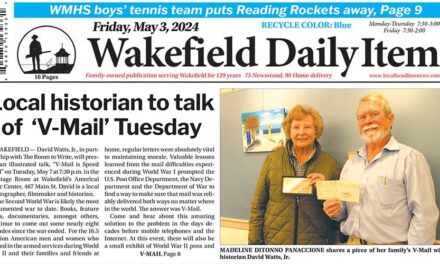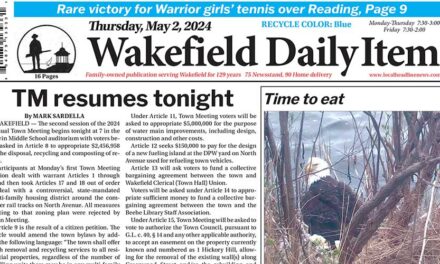Published in the May 5, 2017 edition.
By MARK SARDELLA
WAKEFIELD – Town Meeting last night overwhelmingly approved three articles intended to ban any recreational marijuana business from operating in the town of Wakefield.
The measures included amendments to both the Zoning and General bylaws prohibiting recreational pot businesses in town as well as a move calling for a moratorium on any pot businesses until July 1, 2018.
Town Counsel Thomas Mullen said that after Massachusetts voters approved a ballot question legalizing recreational marijuana last November, he was asked by the Board of Selectmen to come up with as surefire a way as possible of assuring that no recreational pot business could open in town. The three seemingly overlapping Town Meeting articles, he said, offered the town the best protection against commercial recreational marijuana businesses.
After Town Administrator Stephen P. Maio made the motion on Article 25 (the zoning amendment) he asked Police Chief Rick Smith to make speak on the issue.
Using a PowerPoint presentation, Chief Smith argued against allowing recreational marijuana businesses in town, debunking several of the pro-legalization arguments, including the notion that “It’s just a plant.”
He talked about the high-potency derivatives that would be legal for retail sale in pot shops along with edible marijuana products and concentrates. He said that Colorado (where marijuana is legal) was unable to prevent young children from getting hold of these products which are often indistinguishable from familiar products that contain no THC (the active ingredient in marijuana).
Chief Smith talked about the sharp rise in the potency of marijuana in the last 20 years even as it has become easier for kids to acquire. He said that the youth use rate in Colorado has risen 20 percent since legalization and marijuana-related fatalities have spiked sharply in states where the drug is legal.
Smith also dismissed the argument that legal sale of marijuana would generate windfall tax revenues. He said that under the current law, municipalities could only levy a 2 percent tax on pot sales. He said that the tax revenue “means nothing. Our concern is our children.”
Elizabeth Parsons of Essex Street agreed, saying that her concern was edibles getting into the hands of kids as well as drugged driving.
Jim Scott of Elm Street also supported efforts to prohibit commercial marijuana establishments in Wakefield. He recalled that the drug was a problem back in the 1970s when he ran a local youth center.
Selectman Tony Longo also spoke in favor of Article 25, saying that commercial marijuana businesses “won’t make our town better.”
Laurel Gourville, a medical professional who lives on Reynolds Road, said that the commercial marijuana industry uses the old tobacco industry playbook in that it seeks to expand profits by encouraging more use. She likened the zoning prohibition to towns that elect to stay “dry” and prohibit alcohol sales.
Doug Butler of Main Street spoke against the proposed ban on pot businesses, calling it “hypocritical” because the town “cheers” businesses that sell alcohol. Banning pot businesses, he maintained “makes us look backward.”
When Town Moderator William Carroll called for a vote, it was clear that the voters were overwhelmingly in favor of Article 25, which, as a zoning amendment required a two-thirds vote. But since it was not unanimous, the vote had to be counted. The final vote on Article 25 was 118-22 in favor.
Article 26, the General Bylaw amendment to ban marijuana businesses from Wakefield required only a simple majority and passed by a similar lopsided vote.
Finally, Article 27, the moratorium article, passed by a hand-counted vote of 121-4.
Mullen indicated earlier in the meeting that he was confident that the Massachusetts Attorney General would approve the Zoning prohibition in Article 25. But if for any reason articles 25 and 26 were invalidated, Article 27’s moratorium on pot businesses until June 30, 2018 would still offer the town time to weigh its options.




